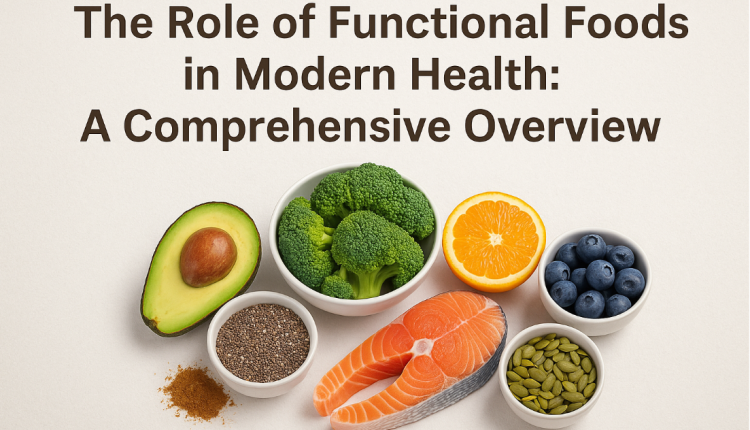In recent years, the concept of functional foods has gained significant attention in the realm of nutrition and health. These are foods that offer health benefits beyond basic nutrition, playing a crucial role in disease prevention and overall well-being. As the global population becomes more health-conscious, understanding the impact of functional foods on human health is essential.
Understanding Functional Foods
Functional foods are defined as foods that provide additional health benefits beyond their nutritional value. These benefits may include reducing the risk of chronic diseases, enhancing immune function, and promoting optimal physiological functions. The concept originated in Japan in the 1980s, where the term “Foods for Specified Health Uses” (FOSHU) was introduced to categorize foods with proven health benefits.
Examples of functional foods include:
- Probiotic Yogurts: Contain live beneficial bacteria that support gut health.
- Fortified Cereals: Enriched with vitamins and minerals to address specific nutritional deficiencies.
- Omega-3 Rich Fish: Such as salmon, which supports heart and brain health.
- Whole Grains: Like oats and barley, which aid in digestion and help regulate blood sugar levels.
Health Benefits of Functional Foods
Cardiovascular Health
Functional foods can significantly impact heart health. For instance, omega-3 fatty acids found in fatty fish like salmon and mackerel have been shown to reduce inflammation and lower the risk of heart disease. Additionally, foods high in soluble fiber, such as oats and legumes, can help lower LDL cholesterol levels.
Digestive Health
Probiotic-rich foods, including yogurt, kefir, and fermented vegetables like kimchi, introduce beneficial bacteria into the digestive system. These bacteria aid in maintaining a healthy gut microbiome, which is essential for nutrient absorption and immune function.
Immune System Support
Certain functional foods are known to bolster the immune system. Citrus fruits, rich in vitamin C, enhance the production of white blood cells, which are vital for fighting infections. Garlic and onions contain allicin, a compound with antimicrobial properties that can help ward off illnesses.
Bone Health
Calcium-fortified foods, such as plant-based milks and certain cereals, contribute to bone strength and density. Vitamin D-fortified products also play a role in calcium absorption, further supporting skeletal health.
Incorporating Functional Foods into Daily Diet
Integrating functional foods into one’s diet doesn’t require drastic changes. Simple substitutions and additions can make a significant difference:
- Breakfast: Opt for oatmeal topped with berries and flaxseeds instead of sugary cereals.
- Snacks: Choose yogurt with live cultures or a handful of nuts over processed snacks.
- Meals: Include fatty fish like salmon or mackerel in weekly meal plans.
- Beverages: Replace sugary drinks with green tea or fortified plant-based milks.
Challenges and Considerations
While functional foods offer numerous health benefits, it’s essential to approach them with informed caution:
- Overconsumption: Relying solely on functional foods without a balanced diet can lead to nutritional imbalances.
- Misleading Claims: Not all products labeled as “functional” have scientifically proven benefits. It’s crucial to research and choose products backed by credible studies.
- Individual Needs: Nutritional requirements vary among individuals. Consulting with healthcare professionals can help tailor dietary choices to specific health needs.
Future of Functional Foods
The functional food industry is poised for continued growth, driven by advancements in food technology and increased consumer awareness. Emerging trends include personalized nutrition, where diets are tailored based on genetic profiles, and the development of functional foods targeting specific health conditions like diabetes or cognitive decline.
Conclusion
Functional foods represent a promising avenue for enhancing health and preventing diseases through diet. By understanding their benefits and integrating them thoughtfully into daily meals, individuals can take proactive steps toward improved well-being. As research continues to evolve, functional foods will likely play an increasingly significant role in public health strategies worldwide.
- Advertisement -

